Leveraging Reviews Insights to Optimize Product Pages for Mid-Market Beauty Brands
The beauty industry thrives on innovation combined with data, particularly among "mid-market" beauty brands that aim to meet more niche consumer needs than their enterprise competitors. In this blog post, we explore the impact of consumer feedback and the role of AI-powered analytics in achieving quick wins. We analyzed thousands of online ratings and reviews of highly acclaimed products by several mid-market players and extracted practical insights to help optimize your e-commerce product pages specifically and drive higher revenue.
Let it also be known that our expert recommendations are not limited to any specific brand. Rather, they're to drive innovation for all cosmetic industry frontrunners. Let's beautify your strategies like never before!
What is a Middle (Mid) Market Beauty Brand?
Middle-market cosmetic brands, often referred to as mid-market or middle-market beauty brands, are typically defined by their financial performance, size, and market position. These brands are larger than small businesses but not as large as major industry leaders like L'Oréal or Estée Lauder. They often generate annual revenues ranging from $10 million to $1 billion.
The Importance of Mid-Market Beauty Brands
The importance of middle-market cosmetic companies lies in their ability to drive innovation and cater to a diverse consumer base. These companies can adapt quickly to market trends and consumer demands, often introducing new and unique products that push industry standards. Additionally, they contribute significantly to the economy by providing jobs and fostering competition, which can lead to better products and services across the cosmetics industry.
In terms of growth, the global cosmetics market, including middle-market brands, is expanding. The premium cosmetics segment, for instance, is witnessing significant growth due to increased consumer demand for high-quality products with proven efficacy. This trend is supported by rising disposable incomes and greater consumer awareness about beauty and personal care, particularly in regions like Asia-Pacific and North America (Grand View Research) (Spherical Insights) (Future Insights).
How Product Reviews Impact Beauty Brands
Consumer reviews significantly influence companies of all sizes by shaping brand perception, guiding product development, and driving purchasing decisions. Just check out some key insights and statistics about the impact of consumer reviews in the cosmetics industry:
- High Impact of Reviews: Approximately 60% of beauty shoppers are motivated by the recency of reviews, and a similar percentage are influenced by the volume and content of reviews (GCI Magazine). This underscores the importance of continuously generating and maintaining positive reviews.
- Trust in Peer Recommendations: Consumers place high trust in peer reviews, with social media platforms like Instagram and YouTube playing a pivotal role in product discovery and evaluation (Exploding Topics) (cosmeticsdesign.com).
- Influencer Reach: Around two-thirds of beauty shoppers turn to influencers to discover new products. Influencers, especially those with expertise like dermatologists, strongly impact consumer trust and product credibility (Exploding Topics) (cosmeticsdesign.com).
- Market Growth: The beauty e-commerce sector is projected to grow by 77% between 2021 and 2026, highlighting the increasing shift towards online platforms where reviews and ratings are crucial for sales (Exploding Topics).
- Ad Spending: Beauty companies spent approximately $7.7 billion on advertising in 2022, with a significant portion allocated to digital channels. This investment underscores the reliance on online reviews and social media engagement to attract and retain customers (Exploding Topics).
4 Actionable & Data-Driven Tips for Beauty Product Pages
From foundations to creams and award-winning serums, we delve into four prevalent challenges in cosmetic product development and marketing by addressing common consumer complaints about skincare and makeup. Our actionable recommendations provide managers with practical insights that can be promptly applied to their eCommerce product pages. Swift implementation of these strategies can swiftly enhance customer satisfaction and boost overall product performance.
1. Introduce a similar "Find Your Shade" feature and make it more accessible to boost customer satisfaction
As the beauty industry increasingly emphasizes inclusivity, providing a wide range of makeup and skincare options suitable for diverse skin colors is essential. Many industry leaders, however, can be challenged by consumers' demands to produce products that actually complement their individually unique skin shades.
One effective solution to help customers navigate this issue is incorporating a foundation shade finder tool into a cosmetic brand's mobile app or website. This tool, whether digital or available in-store, utilizes advanced algorithms to analyze users' skin tones and recommend the most suitable foundation shade from the brand's collection. Additionally, some brands offer shade-matching quizzes or provide samples for customers to try different shades at home before purchasing.
As an illustration, emerging brands like Rare Beauty, founded by celebrity Selena Gomez, are dedicated to crafting products that enhance natural beauty while championing self-acceptance and mental health awareness. Their popular Liquid Touch Weightless Foundation, boasting over 5,000 global reviews, has garnered praise for its excellent coverage. However, many complaints concern customers struggling to find their ideal shade match.
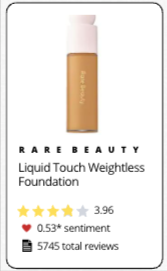
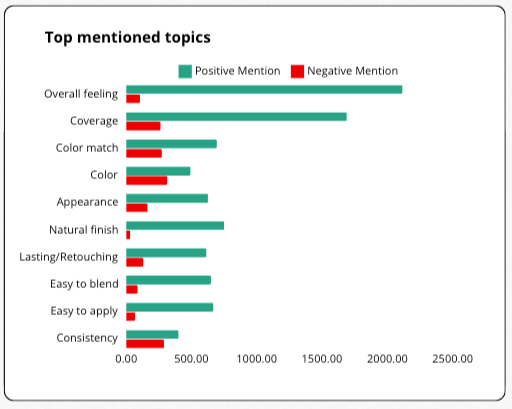

Rare Beauty has taken steps to address this issue by introducing a fun and personalized quiz on its website to assist customers in discovering their perfect foundation shade. Despite this effort, our review analysis suggests that ensuring the accessibility of this tool across various platforms, such as Sephora, is crucial for enhancing the customer experience and expanding reach.
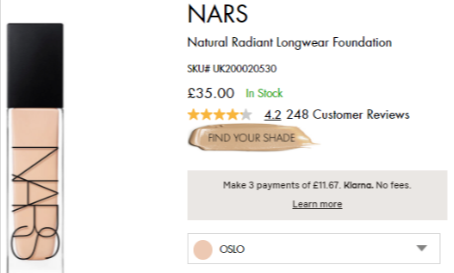
Example of effectively showing a find-my-shade tool on a product page
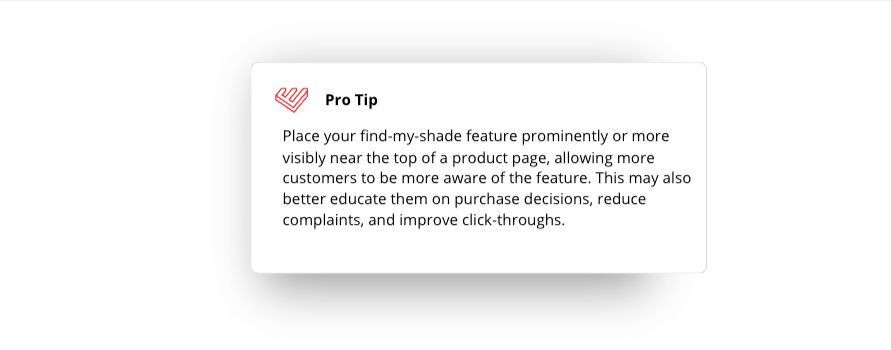
2. Better educate consumers on using (highly potent) serums to reduce complaints and increase ratings
Facial serums are a beauty staple, and nearly half (47%) of consumers age 45 and above purchase anti-aging products. What's more, these serums that claim to 'reverse signs of aging' usually contain highly potent ingredients, such as retinol and vitamin C, especially when mixed together.
Many consumers are unaware of this, such as with the industry's worshipped serum, the Niacinamide 10% + Zinc 1% Oil Control Serum by The Ordinary, an "abnormal beauty company" known for its affordability and use of highly effective ingredients.
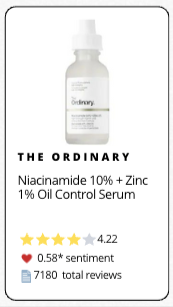
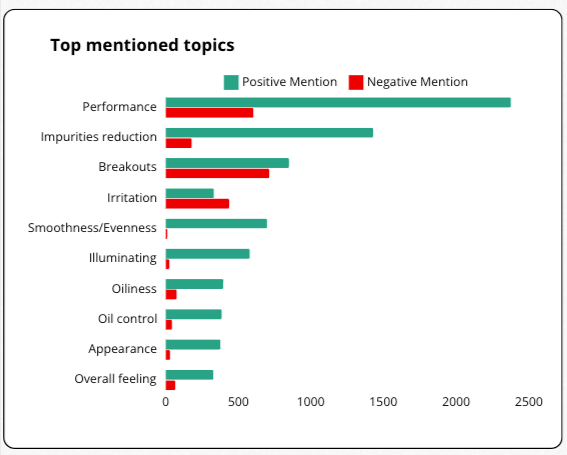
Based on our analysis, while Performance is one of the product's most positively mentioned aspects, Breakout and Irritation are its top negatively mentioned features, especially when these are associated with a lack of visible results.

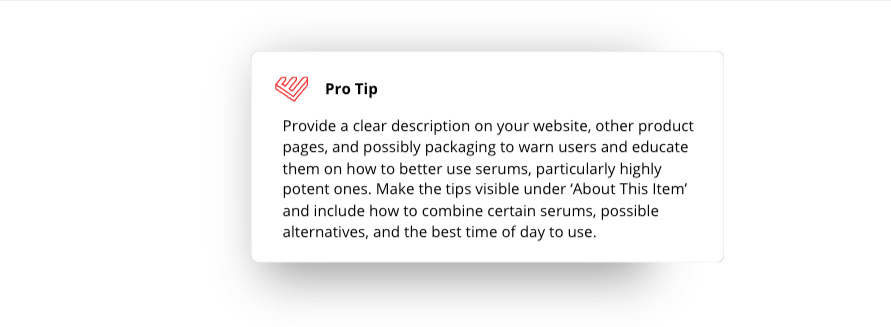
3. Leverage your product's strengths and highlight them across ads to optimize sales
Sales of eco-friendly products, such as vegan, cruelty-free, and plastic-free options, are surging, outpacing demand for products with solely clean ingredients. Projections suggest that by 2027, the global market for natural beauty products will reach a staggering $54.5 billion.
Korres, an esteemed mid-scale beauty brand, is at the forefront of this trend with its range of natural skincare offerings. Founded in Greece, Korres prides itself on using natural, eco-conscious ingredients in its formulations, emphasizing efficacy while championing sustainability and ethical practices.
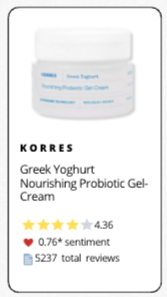
However, despite the popularity of Korres Greek Yoghurt Nourishing Probiotic Gel-Cream, some consumers have raised concerns about its scent. It's important to note that this 'unpleasant' odor stems from the cream's natural constituents, assuring users that it poses no harmful chemical risks. In fact, the product remains safe and vegan-friendly, providing a nourishing experience sans synthetic fragrances.
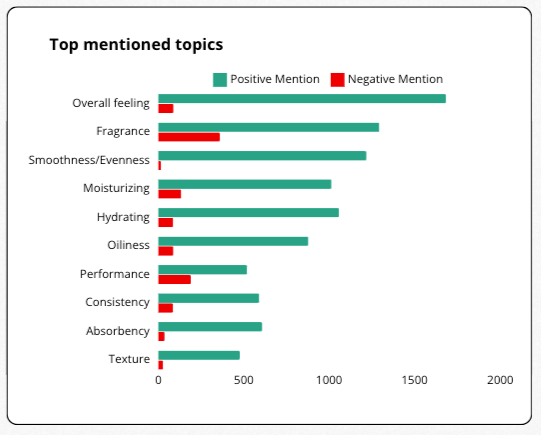

It's important to note that this 'unpleasant' odor stems from the cream's natural constituents, assuring users that it poses no harmful chemical risks. In fact, the product remains safe and vegan-friendly, providing a nourishing experience sans synthetic fragrances.
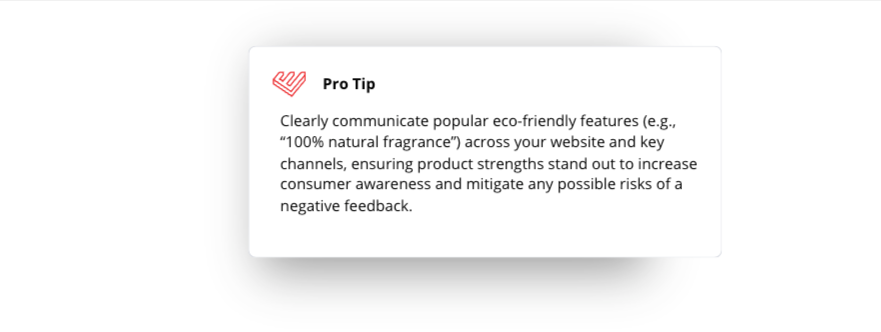
4. Implement quick tutorial videos on key eCommerce channels
Many do not live without makeup pens, particularly those for eyelashes and eyebrows, another beauty routine staple. Considering their design is typically that of a thin and elongated stick with a removable "wand," it can be very common for these cosmetic pencils to break.
Anastasia Beverly Hills (ABH) is a renowned beauty brand known for its wide range of high-quality cosmetics, particularly acclaimed for its eyebrow products. Founded by Anastasia Soare, the brand is celebrated for its innovative formulas, diverse shade ranges, and iconic brow products that have garnered a loyal following in the beauty industry.
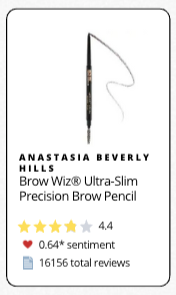
The Brow Wiz® Ultra-Slim Precision Brow Pencil is praised all over the web, with an average rating of 4.4 stars among over 16,156 reviews globally! The customer sentiment index performs decently (0.64), meaning consumers perceive this product positively overall. ABH's 'award-winning' product gives natural results and stays long on the skin. But there is one fatal flaw: the fragile brush.
Some customers have noted a recent decline in the product design, which has led to dissatisfaction and premature discontinuation of use, primarily due to the brush's fragility.
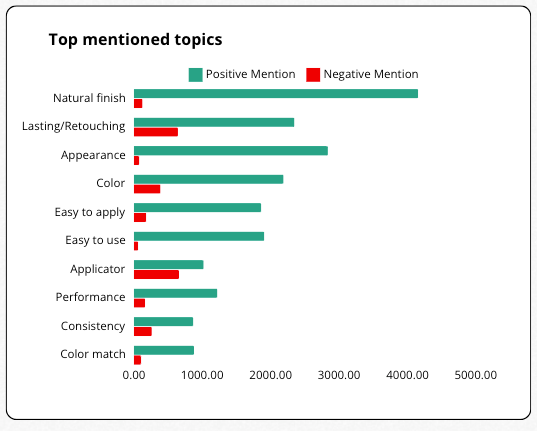

In response, ABH could explore enhancing the pencil's design for long-term durability. In the interim, brands facing similar issues should clearly communicate the need for careful usage in their product descriptions. By setting appropriate expectations upfront, brands can significantly reduce return rates and mitigate negative product reviews, ultimately enhancing customer satisfaction.
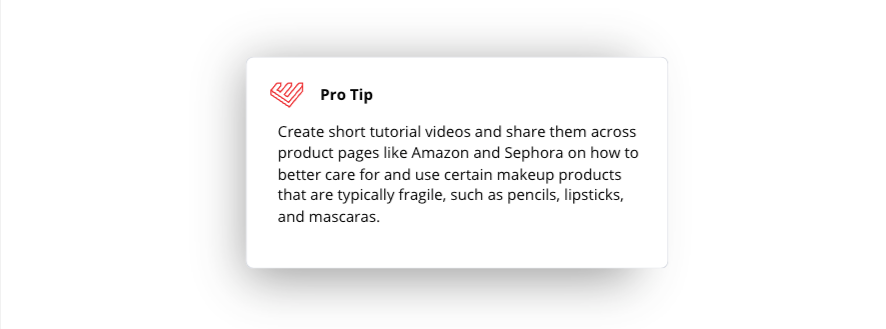
Conclusion
In this comprehensive article, we delved into the significance of middle (mid) market cosmetic companies, highlighting their crucial role alongside their bigger competitors. Analyzing verified reviews from leading mid-market innovators, we unveiled potential pitfalls even with highly acclaimed products and provided actionable tips to optimize eCommerce product pages for increased click-through rates and sales.
Harnessing the power of AI, including generative AI, combined with customer feedback analysis, offers invaluable insights to steer product development and meet consumers' dynamic preferences, particularly as mid-market leaders seek to scale and reach enterprise status. Discover how Wonderflow can empower your beauty brand on this fast-track journey here.

Gianluca has 20+ years in customer engagement, innovation, and VoC-driven strategy. An investor and advisor at Startup Bakery, he fosters B2B SaaS innovation in Italy. Previously, he co-founded and led Vivocha, served as Global Head of Innovation at Covisian, and held leadership roles at Reitek S.p.A.



